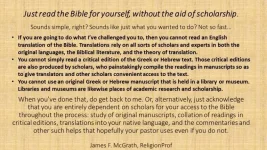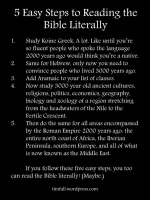The truth — which is so obvious but, unfortunately, not taken seriously enough — is that, no matter what some say to the contrary, every 'Bible-believing' Christian is utterly dependent on scholarship to understand the Bible. No one illustrates this better for me than James F. McGrath in this blog post — from which the image below comes.

It was the same author, in his book The Only True God: Early Christian Monotheism in Its Jewish Context, who drove home to me the point that “for those readers without knowledge of ancient languages, ancient cultures, and other such subjects, the meaning of the Bible is at times not at all clear, while at other times it can seem to clearly mean things that it is unlikely to have meant in its original context.”
He does “not wish to discourage interested individuals from reading the Bible in English translation—far from it.” He just wants “all readers to understand that they are having the Bible interpreted to them by those who have translated it into their native language and are then engaging in interpretation themselves through the act of reading.”
Seeing that “[t]he books they are reading derive from a very different world”, what's the Bible student, or the Christian who wants to understand the Bible, to do? They “should not cease reading but [here's the important bit, I think] should utilize the multitude of books and other resources that scholars have made available, expressly with the aim of helping readers make sense of these ancient texts. Having done that, one should then go on to express one’s conclusions about what these writings mean with an appropriate humility and tentativeness, aware that what seems obvious to a reader today may not have been what seemed obvious to a first-century reader.” [Italics mine]

It was the same author, in his book The Only True God: Early Christian Monotheism in Its Jewish Context, who drove home to me the point that “for those readers without knowledge of ancient languages, ancient cultures, and other such subjects, the meaning of the Bible is at times not at all clear, while at other times it can seem to clearly mean things that it is unlikely to have meant in its original context.”
He does “not wish to discourage interested individuals from reading the Bible in English translation—far from it.” He just wants “all readers to understand that they are having the Bible interpreted to them by those who have translated it into their native language and are then engaging in interpretation themselves through the act of reading.”
Seeing that “[t]he books they are reading derive from a very different world”, what's the Bible student, or the Christian who wants to understand the Bible, to do? They “should not cease reading but [here's the important bit, I think] should utilize the multitude of books and other resources that scholars have made available, expressly with the aim of helping readers make sense of these ancient texts. Having done that, one should then go on to express one’s conclusions about what these writings mean with an appropriate humility and tentativeness, aware that what seems obvious to a reader today may not have been what seemed obvious to a first-century reader.” [Italics mine]

